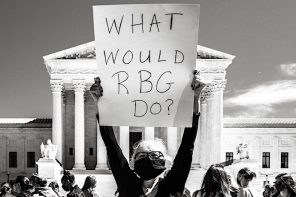This week reproductive rights advocates and feminist bloggers dug into the made-for-parody announcement of the upcoming national anti-contraception action event, “Protest the Pill Day ’08: The Pill Kills Babies.” The “Pill Kills” day, planned for June 7, the anniversary of Supreme Court decision Griswold v. Connecticut, which codified the right to privacy and overturned laws banning contraception, is being organized by the American Life League, an anti-contraception group that follows conservative Catholic ideology; Pharmacists for Life International, an anti-abortion association of pharmacists who organize around broad interpretations of medical “conscience clauses” that relieve them from filling women’s birth control prescriptions on religious grounds; and Pro-Life Wisconsin, the extreme edge of Wisconsin’s anti-abortion community, which formed as a purist protest against other pro-life groups they considered too lenient on birth control and rape and incest abortion exceptions.
Though these aren’t the only groups by far working on anti-contraception activism in the United States, all three are notable for their absolutist approach to anti-family planning work. The American Life League explains itself in such terms: “ALL is opposed to all abortion, contraception, and other threats to the human person and the family. This total protection approach separates us from many of the other major groups.” What also separates them from the mainstream of anti-abortion groups is their vocal insistence on viewing contraception as the “gateway” convenience into the abortion culture; a stance that is increasingly guiding parts of the anti-abortion movement, even as the broader movement still shies from proclaiming its full opposition to all family planning.
The general response of the progressive reproductive rights community to the announcement of “Pill Kills” day (beyond initial surprise that the anti-abortion community was coming out with such an explicit declaration of its real agenda) was focused on the obvious disconnect between opposing abortion and also opposing the means to prevent abortion: a dissonance that reproductive rights advocates hope will turn Americans off. As Christina Page, of Birth Control Watch, wrote at RH Reality Check, “The national day against contraception…was started to convince the American people of a simple and imaginative idea: attempting to prevent abortion is abortion too.”
How the anti-abortion movement imagines this is so is a trip down a revisionist science rabbit hole that anti-contraception activists have been refining for years, based on a primary disagreement with the American Medical Association about the definition of pregnancy: whether when an egg is implanted in the wall of a woman’s uterus, as the medical establishment holds, or when an egg is fertilized, as a growing band of anti-abortion activists holds. By pushing back the beginning of pregnancy, they can broaden the definition of what abortion is, so that what the AMA terms preventing pregnancy, they can call termination. At the same time, other definitions are expanding as well, particularly regarding which people are allowed to stand in the way of women’s access to family planning and abortion services. Which is, of course, where Pharmacists for Life comes in.
Pro-Life Wisconsin tsks at its fellow activists who want to end abortion through incremental gains, chastising the strategy as being too compromised. But in fact, the coalition behind the Pill Kills campaign is making advances through just such incremental gains and attacks: it is a trio of activist groups attacking contraception on a variety of fronts, and hemming in on a woman’s options from all directions. So while ALL and Pro-Life Wisconsin focus on pregnancy starting at conception, Pharmacists for Life focuses on the rights of medical workers: defined in increasing broadness to include everyone from doctors who don’t want to perform abortions, to pharmacists who don’t want to make referrals to other pharmacies for prescriptions they won’t themselves fill, to insurers who don’t want to cover medication they profess to disapprove of.
Meanwhile, the American Life League is arguing that the pill is equivalent to abortion, and that the founding case Roe v. Wade rests on, Griswold v. Connecticut, is invalid. Pro-Life Wisconsin likewise is pressing against the right to privacy, while pushing mainstream anti-abortion activism towards a more whole-cloth approach to opposing family planning. As they describe in their FAQ section, they are “so hung up on birth control” for three reasons: the argument that birth control causes “chemical abortions” of fertilized, but unimplanted eggs; a laundry list of ailments they seek to strongly associate with birth control beyond the level of risks and side effects recognized by medical authorities: and most disturbingly, their emphasis on opposing the “contraceptive mentality.”
“The contraceptive mentality of wishing to separate the good and natural effect of the conjugal act from the activity itself creates a hostility to life (pregnancy). This mentality puts up a barrier against God’s creative will. If the desired effect of the contraceptive fails (a common occurrence), then legal abortion enables couples to terminate an unplanned pregnancy. Human beings, as mere co-creators, have no right to kill what God, the Author of all life, has created in His infinite wisdom.”
This holistic sense of ideology, rather than a concrete set of political goals, is something more in line with the pro-natalist movements I’ve written about elsewhere, who are working towards creating a new family theology that prizes fertility and traditional gender roles above all, than with traditional anti-abortion activism. The driving religious sense behind the “Pill Kills” campaign is present in its “talking points” as well, which suggest answering the challenge, “Isn’t it better to be on the pill when you are sexually active?” with this bit of moral wisdom: “sexual activity outside of marriage is seriously wrong.”
In a further “What’s the Matter With Wisconsin” moment, an indication that theology and religion, more than even the pseudoscience of the “pill-kills” argument, is found in the strange testimony of Neil Noesen, a former Wisconsin K-Mart pharmacist whose refusal to fill a birth control prescription in 2002 helped spark the nationwide movement of pharmacists’ refusal rights. Noesen was disciplined by the Wisconsin Pharmacy Examining Board in 2005 for his actions: both refusing to fill a student’s birth control prescription after asking whether it would be used for contraceptive purposes, and then refusing to transfer it to another pharmacy, but withholding it at the K-Mart and forcing the student to wait two days until another pharmacist was on duty. Noesen appealed the case to the Wisconsin Circuit Court and Court of Appeals, both of which ruled against him, and now, with the help of the Thomas More Society, an anti-abortion law center that focuses on culture-war cases, Noesen is appealing to the Wisconsin Supreme Court.
In a press release from the Thomas More Society, Noesen was quoted as telling the Court, “I can’t aid, abet, encourage, refer, transfer, or participate in any way with something that I feel would be impairing the fertility of a human being.”
The focus on impairing fertility is new—not to theological and movement discussions of these issues, which abound with “don’t fix what isn’t broken” bon mots—but in legal and activist discussions, which have tended to focus more on the pill-as-abortion-as-murder, or the health risks associated with using the pill. Slipping into religious language, and charging that hindering someone’s fertility is an act that can be covered under religious “conscience clause” exemptions, indicates that this underground movement is readying itself for the mainstream.




